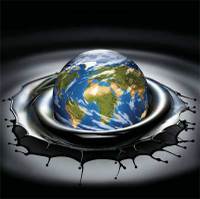One of the great ironies of American history is how, at a time of crisis, the key to the next generation’s desires is downplayed while the proponents of the old order sound loud and brassy.
- In 1860 Democrats stood loudly for slavery, while Lincoln talked only of Union and limiting its reach.
- In 1896 Democrats stood loudly against a Cross of Gold, while McKinley talked quietly about progressive reform.
- In 1932 Republicans stood firm against stiff action on the Depression, while FDR talked only of experimentation and hoped for a balanced budget.
- In 1968 Democrats railed against Richard Nixon’s threat to the New Deal, while Nixon spoke out in relative moderation on behalf of the Culture Wars to come.
In 2008 Republicans are loudly demanding pro-oil policies, while Democrats speak gently about alternative energy and conservation, rather than a War Against Oil.
This is fine by me.

(Picture from HowStuffWorks.)
America’s slavery to the oil power is complete, and as debilitating
as black slavery was by the late 1850s. Back then Frederick Law Olmsted
(yep, that Frederick Law Olmsted) was writing movingly of how slavery bound whites as much as it did blacks. Only extremists listened to him.
The same is true of oil and Americans today. Perhaps no segment of
our society is so addicted as those who are poor. I still see poor
people in my neighborhood driving old gas guzzlers, their engines
idling, their air conditioners blowing, smoking cigarettes. You do,
too. They remind me of those Southerners who owned no slaves yet died
in the coming war. Many will doubtless vote for John McCain. But they
are the past.
It is vital that we all understand what is at stake here.
Even if, by drilling offshore, by exploiting Alaska, by using tar
sands and oil shale, we were able to drive the price of OPEC oil down,
we would have accomplished nothing. We would still be locked into a
market controlled by foreigners. And we would have destroyed the
environment.
On the other hand, by increasing our efficiency, by delivering wind
and solar and geothermal power, by re-engineering our grid (both to
save power and to buy it), and by building a hydrogen infrastructure,
we not only save the environment, but create domestic reserves which
can’t be controlled by outsiders and gain technology we can export.
To those who doubt, the answer is simple. Yes we can.
The choice is just that stark. But that’s the way it is in crisis
elections. They’re not about the candidates. The issues can’t be fudged
or spun. They are what they are, choices between renewal or self-destruction.
Those fortunate (or unfortunate) to be adults at such times have the fate of the nation in their hands. And in this case, the fate of our planet.










